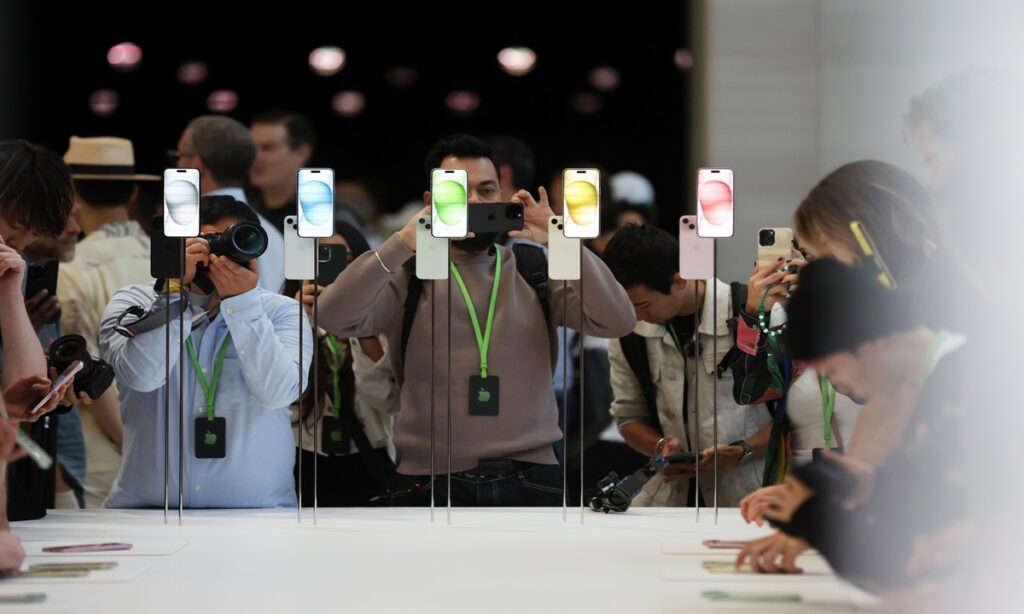New model under criticism of ‘lacking innovation’
Apple held its launch event for new iPhones on Wednesday morning (Beijing time), unveiling a new series of iPhones including the iPhone 15, iPhone 15 Plus, iPhone 15 Pro and iPhone 15 Pro Max. It also updated an Apple Watch and AirPods Pro products.
Compared with previous models, the new iPhones have new chips and new titanium shells and come with a USB-C charging cable.
After the event, Chinese consumers expressed mixed reactions.
A consumer surnamed Liu planned to switch her iPhone 11 to an iPhone 15 Pro Max. “The battery and storage of my current phone are troublesome, and I will make an appointment to get one as soon as possible,” she told the Global Times on Wednesday.
“New products still have appeal to Apple’s loyal fans, and prices are relatively affordable compared with Apple’s previous products. In addition, many consumers happen to want to buy a new phone, so sales are expected to remain strong in the Chinese market,” Ma Jihua, a Beijing-based senior industry analyst, told the Global Times on Wednesday.
Other consumers are taking a wait-and-see approach, saying that the iPhone 15 lacks innovation.
Another consumer surnamed Xu, who owns a series of Apple products like the Apple Watch and iPad, told the Global Times on Wednesday that she had decided to skip the iPhone 15, since she found the latest models weren’t upgraded enough. “I might wait for future models,” Xu said.
“Freshness comes from mystery. Everything that was released at today’s event was exactly as previously revealed, so the products didn’t blow consumers’ minds,” Liu Dingding, a Beijing-based veteran tech analyst, noted.
Ma added that Apple hasn’t been particularly emphasizing its technological innovations in smartphones in recent years, but mainly using its brand strength and customer loyalty to sell Apple phone-related products.
Reuters reported that the biggest surprise with the iPhone 15 that will come out September 22 is that the prices remain unchanged. Apple shares closed down 1.7 percent after the event on Wednesday.
Liu Dingding said that Chinese consumers have a wider range of choices. Chinese phonemakers are rapidly catching up and some are even surpassing the iPhone when it comes to certain features.
Apple’s fall event came after China’s tech giant Huawei kicked off online sales for the flagship Mate 60 Pro on September 3, triggering a buying spree among Chinese customers.
On September 8, Huawei launched pre-orders for several new smartphone models, including the Mate X5, the new Mate 60 and Mate 60 Pro models, which sold out immediately. Another round of pre-orders took place late on Friday afternoon, and the phones were sold out within minutes, the Global Times learned.
Ma said that the hot sales of Huawei’s new models have definitely put some pressure on Apple’s new phones, as Huawei lost some high-end users after being restricted by the US in previous years, and Apple has a large market share in the Chinese mainland.
As the new models recently released by Huawei offer a good overall performance and customer experience, it will have some impact on Apple, Ma noted.
“However, phone sales are decided by the market, instead of so-called political factors,” Ma said, noting that Chinese consumers’ enthusiasm for Huawei is not a sentiment created by the company or mandated by the Chinese government.
Mao Ning, a spokesperson of the Chinese Foreign Ministry, told a press conference on Wednesday that there are no laws, regulations or policy documents in China that prohibit the purchase and use of mobile phones of foreign brands, such as Apple.
“We always take an open attitude toward foreign enterprises and welcome them to seize China’s development opportunities and share the fruits of China’s economic development,” said Mao.




